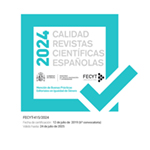Fiber arts and generative justice
Resumen
The fiber arts, because they are practiced in different forms around the globe, have the potential to teach us much about generative justice that unites labor, ecological, and expressive values. The ecological mutualism documented in Navajo corrals supports traditional weaving, dyeing, food, and medicinal practices in a sustainable and generative cycle that survives despite disruption and exploitation. The network of fiber craftspeople, retailers, ranchers, teachers, spinners, and dyers and their organizations supports the social mutualism of fiber communities. Fiber arts practices can benefit individuals, communities, the environment, and public health, among other things. Conscious fiber activism and critical making can also be used to explicitly draw attention to problems such as overconsumption, waste, industrial “fast fashion,” labor exploitation, environmental degradation, toxic risks, intolerance, and the devaluing of women and their work. Fiber arts have the potential to support environmental and social mutualism and catalyze a new aesthetic of long-term attachment to meaningful objects and communities, reinforcing the creation and conservation of expressive, ecological, and labor value.
Descargas
##plugins.generic.pfl.publicationFactsTitle##
##plugins.generic.pfl.reviewerProfiles## N/D
##plugins.generic.pfl.authorStatements##
Indexado: {$indexList}
-
##plugins.generic.pfl.indexedList##
- ##plugins.generic.pfl.academicSociety##
- N/D
- Editora:
- Grupo de Investigación Cultura Digital y Movimientos Sociales. Cibersomosaguas
Descarga artículo
Licencia
La revista Teknokultura, para fomentar el intercambio global del conocimiento, facilita el acceso sin restricciones a sus contenidos desde el momento de su publicación en la presente edición electrónica, y por eso es una revista de acceso abierto. Los originales publicados en esta revista son propiedad de la Universidad Complutense de Madrid y es obligatorio citar su procedencia en cualquier reproducción total o parcial. Todos los contenidos se distribuyen bajo una licencia de uso y distribución Creative Commons Reconocimiento 4.0 (CC BY 4.0). Esta circunstancia ha de hacerse constar expresamente de esta forma cuando sea necesario. Puede consultar la versión informativa y el texto legal de la licencia.













